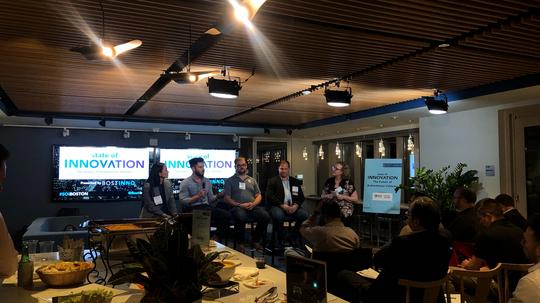
What does the future of the autonomous vehicles industry look like—and what hurdles will we have to overcome to get there?
That was the big question on everyone's mind at BostInno's State of Innovation: Autonomous Vehicles, presented Thursday evening at Analog Garage downtown in partnership with Analog Devices. On deck to discuss the state of the industry were Alexander Terzian, founder of Robodisplay; Anita Kim, a technology policy analyst at Volpe National Transportation Systems Center; Chris Jacobs, VP of autonomous transportation and safety at Analog Devices; and Sam Anthony, co-founder and CTO of Perceptive Automata. Affectiva chief marketing officer Gabi Zijderveld moderated the panel.
We live-tweeted the discussion throughout the evening, and we've rounded up a few key takeaways below.
Note: In a handful of tweets, Chris Jacobs is mistakenly referred to as Chris Jacobson. We regret the error.
Building machines means thinking like a human
Autonomous vehicles do not simply emerge on the street as fully fledged self-driving machines. Instead, engineers are chipping away at problems bit by bit, bringing a uniquely human perspective into the equation.
Today, human drivers can perceive plenty of things about their environment: how nearby pedestrians might act or what the typical level of road rage is in their geographic area, for example. How can we bring human insights to solve human problems?
There is a struggle between personal privacy and collective safety
The panelists on Thursday generally agreed that they'd like to keep people's personal data private and anonymized—yet, they all acknowledged that it's a difficult to task to accomplish that while also providing machines with all the data needed to provide a good (and safe) user experience.
Terzian's company relies on targeted advertising and therefore personal data. Autonomous vehicles themselves rely on data about their environment, including humans, to make driving decisions. And then there's the major hurdle of proprietary data: companies may not have an incentive to share with one another. So where does that leave us?
Consumer adoption will be incremental
When we think of the term "autonomous vehicle," we probably don't think about the automized systems already in place: auto-pilot on airplanes, back-up cameras on cars. Yet, it's unlikely that most people will jump into a fully self-driving car. Instead, we'll see change happen bit by bit as new engineering problems are solved.
Thank you to all who came out last night, and thanks again to our presenting sponsor:
We hope you'll join us next week at Inno On the Road: Startups to Watch Presented by UMass Lowell and next month at 50 on Fire, where we'll honor the top 50 innovators in Boston's startup ecosystem. See you there!








